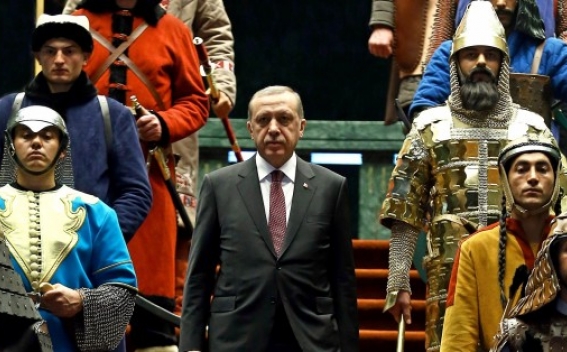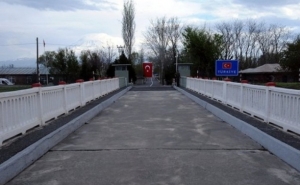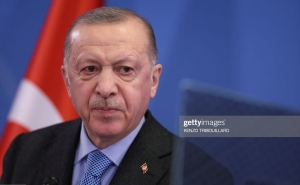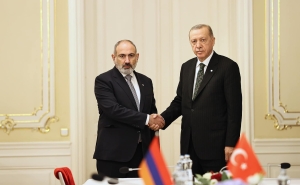Erdogan Nostalgic about the Ottoman Empire

In the recent years, Turkey's growing ambitions have reached their peak. Since 2002, Turkey's ruling Justice and Development Party's policy, in fact, has been based on expansionist ideologies, such as neo-Ottomanism, Pan-Turkism and pan-Islamism. These are the components that form Turkish President Recep Tayyip Erdogan’s vision of "New Turkey".
A few days ago, Erdogan openly stated that "the physical boundaries do not correspond to the borders of Turkey’s heart." Reminding of Turkey’s national covenant (the Kemalists' program of ''Struggle for independence'' which in fact reflected the basic principles of the national policy of the Kemalist movement), Erdoghan said that Turkey cannot remain indifferent to such regions and countries such as Iraq, Syria, Libya, Crimea, Karabakh, Bosnia, Georgia, Ukraine, the Balkans, North Africa and "other brother regions." Erdogan thus told about the ambitions of Turkey towards these areas. "When Turkey will lose its independence and lose its future, then we will lose interest toward these territories," the Turkish president said.
Earlier, Erdogan once again complained of the Lausanne Treaty (Treaty of Lausanne, signed in 1923, defines the boundaries of modern Turkey. According to the agreement, Turkey refused its claims over other parts of the Ottoman Empire). "In 1914, our premises consisted of 2.5 million sq/km, and were reduced by the Treaty of Lausanne, reaching only 780,000 sq/km," Erdogan complained.
It is no secret that Tayyip Erdogan's government with its idealogies of neo-Ottomanism, Pan-Turkism and pan-Islamism became an alternative to Turkey's founder Kemal Ataturk's nationalism. The ideology of neo-Ottomanism received a new birth and led to the foundation of the Turkish foreign policy in the beginning of 2000s based on the theories developed by Ahmet Davutoglu. The main idea of neo-Ottomanism lies in the fact that Turkey is seeking to political, diplomatic, economic and other types of dominance of the former Ottoman Empire, a number of regions (including the Middle East, Balkans, North Africa, Caucasus). If we add the factor of political Islam, as well as the idea of Turkic unity, we will see the AKP's foreign policy model.
Over the past decade, Turkey had an active policy in accordance with the spirit of this ideology to carry out the above-mentioned directions. And if in case of Middle East and the Arab world, Turkey's primary objective was to become the driving force, then in case of Caucasus "zero problem" with its neighbors was the main approach.
Leaving aside the issue of the effectiveness of this policy (including in the context of wars and conflicts right by the borders of Turkey), there comes the problem of resistance to Turkish ambitions. In particular, the Greek Foreign Ministry has called on Turkey to respect international agreements, and the president in turn warned that his statements could undermine regional security, ekathimerini.com reports.
“The rhetoric of Turkish President Erdogan, in any perspective, even the most benevolent, unfortunately directly or indirectly undermines the Treaty of Lausanne, not to mention Greek-Turkish relations and relations between the European Union and Turkey,'' the Greek President Prokopis Pavlopoulos said.
In the future we will surely witness new manifestations of Erdogan’s expansionist policy, as it implies to the AKP's foreign policy model. As the "principle of zero problems with neighbors" does not justify itself for a long time already, Turkey actively gets engaged in all possible conflicts without ''any invitation'', openly stating its territorial ambitions.
Other materials on this subject
- 2 dead, 2 injured after fire at lodging section of Armenian Catholic Church in Istanbul He said the firefighter-rescue team arrived immediately. Armenian Catholic Archeparch of Istanbul Archbishop Lévon Zékiyan was also on the scene.
- Turkey is sending Cold War-era cluster bombs to Ukraine – FP The weapons are designed to destroy tanks by bursting into smaller submunitions, which can linger on the battlefield for years if they do not immediately explode. Each round scatters about 88 bomblets.
- Fire erupts in Turkey’s Black Sea port of Samsun following explosion The causes for the explosion that led to a fire are currently being analyzed.
- EU Urges Turkey to Stop Offering Russia Solutions to Circumvent Sanctions Speaking about the EU's engagement with Turkey, an important neighbor, EU partner and candidate country for EU membership, we stress the importance of ensuring that Turkey's foreign policy is aligned with...
- Any Change of Internationally Recognized Borders in Region is Unacceptable – Iranian President to Erdogan "The basis of our policy in the region is that the fates of the countries must be determined by themselves and that their national sovereignty and territorial integrity must be respected" Raisi told Erdogan...
-
 17:08
17:08The regular session of the Anti-corruption Policy Council takes place in Jermuk
-
 15:05
15:05The Prime Minister sends congratulatory messages to the supreme leader of Iran and the President of Iran
-
 11:11
11:11Armenia sends earthquake aid to Turkey
-
 10:43
10:43Commemoration of the Pontiff St. Sahak Partev
-
 09:16
09:16Some roads are closed and difficult to pass in Armenia
-
 19:55
19:55Phone conversation of the Foreign Minister of Armenia with the U.S. Assistant Secretary of State for European and Eurasian Affairs
-
 18:30
18:30Prime Minister Pashinyan and President Khachaturyan meet
-
 18:20
18:20Ararat Mirzoyan with Co-Chairman of the OSCE Minsk Group of France Brice Roquefeuil
-
 17:01
17:01Humans could land on Mars within 10 years, Musk predicts
-
 16:45
16:45France, US urge 'immediate' end to Nagorno Karabakh blockade
-
 16:01
16:01Blockaded Nagorno Karabakh launches fundraiser to support quake-hit Syria
-
 15:59
15:59Earthquake death toll in Turkey rises to 18,342
-
 15:43
15:43Ararat Mirzoyan Held a Telephone Conversation with Sergey Lavrov
-
 15:06
15:06French president rules out fighter jet supplies to Ukraine in near future
-
 14:47
14:475 Day Weather Forecast in Armenia
-
 14:44
14:44President Vahagn Khachaturyan wrote a note in the book of condolences opened in the Embassy of Syria in Armenia
-
 14:20
14:20Azerbaijan’s provocations impede establishment of peace and stability – Armenian FM tells Russian Co-Chair of OSCE MG
-
 12:57
12:57France representation to OSCE: Paris calls on Azerbaijan to restore freedom of movement through Lachin corridor
-
 11:40
11:40Command of Kosovo forces highly appreciated preparation of Armenian peacekeepers
-
 10:16
10:16The United States withdrew from sanctions against Syria for six months the provision of assistance after the earthquake
day
week
month
Humidity: 25%
Wind: 0.51 km/h









